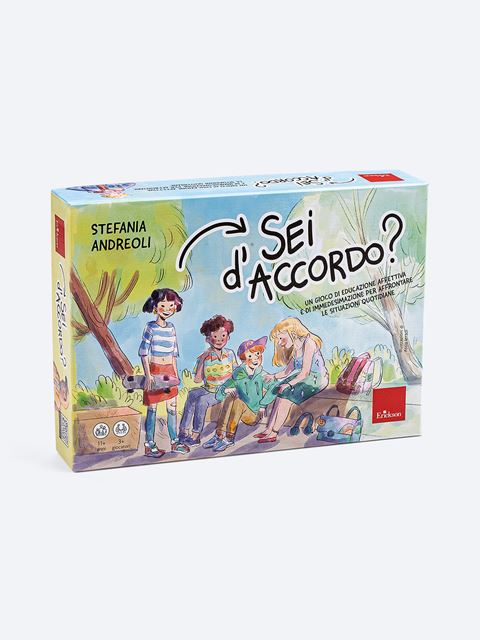 EN
EN
 PT
PT
An emotional education game for dealing with everyday situations

Product: Teaching tools
Trim size in cm: 21,5 x 15,5 x 4 cm
ISBN: 9788859030409
Publication date: 01/10/2020
Suitable for: Lower secondary 1st level (ages 10-11), Lower secondary 2nd level (ages 12-13)
REQUEST A SAMPLE OR MORE INFORMATION
A fun and engaging game designed to challenge children to think and express their skills of identification and empathy, accompanying them on a stimulating path of affective education.
Read about a situation and interpret it from the point of view of one of the characters: will the players be able to guess your position and understand what you think?
The themes dealt with in this game are those that are encountered in reality on a daily basis: love, friendship, discovery, inclusion, the contrast of stereotypes, meeting others, doubt, making mistakes, problem solving, the generation gap…
Educational goal of the game
The educational goal of the game is to encourage reflection with the adult on the most common situations of daily life that involve adolescents. To do this, players are asked to “put themselves in the shoes” of someone other than themselves, sometimes a teenager, sometimes an adult, trying to interpret a point of view which does not always coincide with their own. The skill of the other players will consist in knowing how to ask the right questions to guess the opinion of the character whom the player is interpreting, sensing thoughts that are not always expressed or unmasking preconceptions.

A game about affective education and identification to face everyday situations

An adequate affective education is essential for the growth path of children, who need adult guidance provided by parents or teachers. They help children think about the complexity relative to their own and others' subjectivity, and make friends with the thought process as the most powerful means of all to guide their actions.
The game
Do you agree? challenges children to think and express their skills of identification and empathy, to accompany them in a stimulating path of affective education by dealing with themes that we encounter in reality every day: love, friendship, discovery, inclusion, the contrast of stereotypes, meeting others, doubt, stumbling blocks, problem solving, generational clashes...
The game is designed for 3+ players, ages 11 and up.
THE MATERIALS
The game consists of:

22 situation cards

19 character cards

2 narrator cards

37 voting tokens and 7 pawns

Game board
HOW TO PLAY
The narrator must interpret the situation from the point of view of the character card which he/she has drawn. Subsequently each player asks the narrator a question, and then after careful reflection, has the opportunity to vote by placing a token on the appropriate spaces on the board. Will the players be able to guess the narrator’s point of view and understand what he/she is thinking?

The debate
Using only the cards, it is possible to carry out a workshop activity without keeping score, in order to facilitate reflection among the boys and girls on the themes proposed in the different situations. Each player receives a character card and proposes a debate between the characters in the game on the chosen situation.
This proposed role-playing activity will allow you to develop empathy skills and practice for the role we could find ourselves in, with different situations that could likely happen to us or to those around us.

The winner
You can play in two ways, depending on the time you have available:
From 30 to 45 minutes: the winner is the one who knows how to best put their empathic ability into play, earning points and reaching the finish line first.
Less than 30 minutes: the winner is the one who has obtained the most points after all players have played the role of narrator once, without necessarily reaching the finish line at the end of the game board.
Educational goal of the game
The educational goal of the game is to encourage reflection with boys and girls on the most common situations of daily life that involve adolescents. To do this, players are asked to "put themselves in the shoes" of someone other than him/herself: sometimes a teenager, sometimes even an adult, while trying to interpret a point of view that will not always coincide with his/her own. The skill of the other players will consist in knowing how to ask the right questions to guess the opinion of the character which the player is representing, sensing thoughts that are not always expressed or unmasking preconceptions.
THE AUTHOR
Stefania Andreoli: Psychologist, psychotherapist and analyst, has always worked with adolescents, families and schools dealing with prevention, training, guidance and in clinics. She is president of the Alice Onlus Association of Milan. She writes for Corriere della Sera and is a guest on several radio programs. A former collaborator of the Ministry of the Interior for policies to combat gender-based violence, since January 2020 she has been an Honorary Judge in the Juvenile Court of Milan.